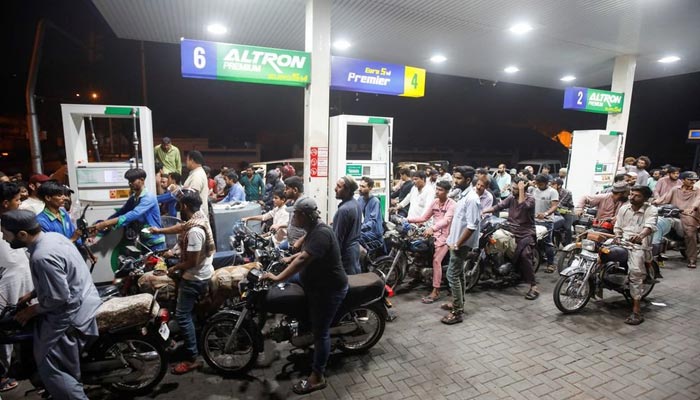Fears of 'exchange losses' led to petrol crisis in Pakistan
Petrol shortage continues in Punjab despite government's warning; sources say only four OMCs are importing petrol
February 11, 2023

- Only four OMCs hold 90% of petrol stock.
- Rest of the companies not importing fuel fearing exchange losses.
- Smaller OMCs don't have even 20 days' stock of petrol, sources say.
KARACHI: Pakistan is witnessing a petrol crisis as only four major oil marketing companies (OMCs), out of 50, hold 90% of the petrol stock, while the rest are not importing the fuel fearing exchange losses, The News reported Saturday.
There is a short supply of petrol in the country with Punjab — the most populous province — bearing the brunt of the crisis. Major and smaller cities, towns and villages in the province do not have the major fuel.
The crisis has worsened in the last few days despite the government's warning to the people from hoarding petrol in anticipation of an increase in its price in the next fortnightly review, slated for February 15, 2023.
Sources in the country’s oil sector have squarely blamed the oil marketing companies, petroleum dealers as well as the government. They pointed out that the majority of the companies were not importing petrol in view of exchange losses, which the government had adjusted only partially and that too, in different phases.
They said that smaller OMCs did not have even 20 days' stock of petrol as they were not importing the fuel because of fears about exchange rate losses.
Only Pakistan State Oil (PSO), Shell Pakistan, Total Parco and Attock Petroleum were importing petrol and 90% of the stock lies with these four companies. There are around 50 OMCs operating in the country and some have limited stock whereas others have gone dry.
“Who will import petrol when there are apprehensions that exchange rate losses would not be adjusted and would take time to be paid back,” an official of an OMC asked.
Sources said that other than the low import of petrol by the majority of OMCs, petroleum dealers were also having a field day and were involved in the hoarding of petrol in view of the expected increase in prices by mid-February.
The ex-refinery price of petrol is showing an increase mainly because of massive dollar appreciation against the rupee. Dealers are exploiting the situation by indulging in hoarding to make windfall profits, oil sector people stated.
The policies by the government have also contributed to the petrol shortage, especially related to taxation on petroleum products.
“If the government has to increase taxes on petroleum products, then it should raise it immediately rather than waiting for the fortnightly review as it gives the opportunity to hoarders to exploit the situation for making huge profits,” the sources said.











